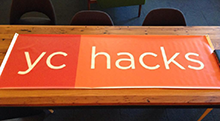My Experience at YC Hacks (Y Combinator’s First Hackathon)
 I wasn’t quite sure what to expect. At 33 years old, I knew I’d probably be older than the vast majority of the 400+ people attending Y Combinator’s first YC Hacks hackathon. But other than that, I didn’t have many expectations.
I wasn’t quite sure what to expect. At 33 years old, I knew I’d probably be older than the vast majority of the 400+ people attending Y Combinator’s first YC Hacks hackathon. But other than that, I didn’t have many expectations.
YC Hacks was my first real hackathon. Many years ago, I went to the first SuperHappyDevHouse (and then 19 out of the first 20 of them), but I never had built and launched a web app in a weekend. Even though I’ve held down full-time jobs as a developer, I still have trouble telling people “I’m a developer.” I’m not a whiz-kid 19-year-old who grew up programming games in his bedroom, nor do I have a Computer Science degree from a prestigious university (I’m a dropout.) I program because that’s how I get to see my ideas come to life–and because it’s fun and addictive for me. And that’s why I signed up for YC Hacks.
With my startup having been acquired a few months ago, YC Hacks seemed like the perfect opportunity to meet new people and get exposed to the latest Silicon Valley trends.
Team? Team? Will You Join My Team?
My first exposure to the other attendees came through the YC Hacks Facebook group, where people seemed to be in desperate need of other people for their teams. At this point, I wasn’t even sure what I wanted to build, and despite a torrent of private messages and emails from people asking me to be on their team, I didn’t commit to anything prior to the hackathon.
“Are you a designer or a developer?” was a popular refrain on the Facebook group, as well as “What’s your stack?” My response was basically along the lines of “I build shit that makes money” and “Whatever works to get the job done, but probably Javascript.” (Ironically, I would end up building a product at YC Hacks that doesn’t have a monetization strategy. More on that in a bit.)
I ended up in a great private message conversation with Dave Fontenot, one of the organizers, a few days prior to YC Hacks. I expressed my concern about not having a team, and Dave said, “Don’t worry about it. Just show up and have fun.”
The Overwhelming First Moments
When I arrived at the Y Combinator headquarters in Mountain View on Saturday morning, I was overwhelmed by the avalanche of people there. And everyone seemed to have a team already! Being an introvert who prefers to hide vs. socialize with people I don’t know, my first instinct was to RUN! I texted a friend of mine with a concern that maybe I should just leave. But something told me to stick it out, even though it was scary.
I met a bunch of people. A guy pitched me on building a product, but I wasn’t interested in that product idea. I pitched a game development team on joining their team, but they weren’t interested. (Pro tip: At least make eye contact with people who want to join your team!) Feeling rejected, I decided to just stick it out until noon, when people could pitch their ideas from the stage.
I listened to pitch after pitch, but nothing stood out to me until Evy Kassirer stood up and pitched a recommendation engine for people to help find the right online courses. This was interesting to me; I’ve always loved the recommendation space, and there are a lot of course providers out there, but not a lot of sites reviewing all the courses that are out there.
Picking a Team and Finding an Idea
I decided to join Evy’s team, which consisted of three students from the University of Waterloo in Canada. A memorable moment for me was when I was telling one of the team members, Calvin Chan, about how I came to Silicon Valley in 1999 and skipped a day of college to go to the IPO party of the startup I was working for at the time, Cobalt Networks. Calvin’s eyes got wide and he said, “I was 6 then.” Fortunately, even at 33, I still look like I’m 24 years old, so I didn’t feel too bad. 😉
It was early Saturday afternoon, and suddenly I got a text message saying a mentor was available for office hours. I had signed up for office hours during my skittish time earlier. I headed back to the office hours table, and met with Brian Krausz, and later Michael Glukhovsky, both of whom turned out to be influential in helping me decide what to build for the weekend.
The Idea I Built
After I wrote my blog post about my company failing a few months ago, I received over 100 personal emails from other startup founders whose startups were in similar positions. Until that day, I really had no idea how pervasive a problem this was in the startup world. Founders who were days from running out of money–founders whose co-founder wasn’t working out–founders who had graduated from an accelerator but couldn’t raise funding. This was a real issue!
After talking with Brian and Michael, I began to sketch out an idea–a “founder support network.” The name just showed up for me in our conversation. A place where founders could find other founders in a similar situation to them. A network that was vetted, so that everyone who responded to a question would be someone trusted.
I decided to split off from Evy’s team and see what I could build in 24 hours. I challenged myself to have a working web app in that time–something where people could actually sign up. I registered the domain foundersupport.net and went to work.
Customer Development
First, I requested more office hours. I needed to do customer development–and where better to do that with the mentors, who were also startup founders? I ended up grabbing some time with Justin Kan, former founder of Justin.TV and now a YC partner. When I explained the idea I’d sketched out, he said, “There’s another team here doing that!”
“Oh!” I said, surprised. I hadn’t known!
“Don’t worry about it,” he said. “It’s a good idea. It needs to happen. Good luck!”
I found the other team, who was indeed building something similar, called PeerHaven. They already had 5 people, which was the maximum team size. Again, I felt the pull to build it myself and see how far I could get in a weekend.
Tackling the Technical Challenges
I needed to figure out what technologies I should use to build my MVP (minimum viable product.) I was already familiar with Zurb Foundation from my startup, so that was my first choice. Javascript and JQuery were an easy choice for quick development on the backend. Firebase, a sponsor, offered a “backend-as-a-service” that I could use to authenticate users and a database to store key/value data, so that was the best choice for rapid development.
But where to host it? When I was running my startup, we hosted everything on Amazon. That’s great for scale, but it’s a monster to set up quickly. Surely there had to be a hosting provider out there that would let me deploy a Foundation website with a few clicks.
Googling around, I found mixture.io. They have an app you can download for Mac or Windows that makes Zurb Foundation, Sass, and Ruby “just work.” I have had a lot of bad experiences with apps like this, so I was wary. But it offered a free trial, so I decided to take it for a test drive.
Mixture.io turned out to be a godsend. It did, indeed, just work. And with their hosting option, I was able to point foundersupport.net to their server and one-click publish my website. WOW. Another brilliant product in the hosting industry–this is one that deserves accolades!
After getting over my “Holy crap, it just works!” moment with mixture.io, I went to work. I purchased a stock photo and set up my basic design–which turned out really well! (Note: It still doesn’t work perfectly on mobile–that’s on my to-do list.)
“Oh God, Now I Actually Have to Write Code!”
Now, it was time to create the magic that made my signup form work with Firebase. Fortunately, the Firebase team had several developers on-site to answer questions. This turned out to be one of my favorite parts of the hackathon. It was so empowering to be able to go to the Firebase team, say “I’m pretty sure this is a dumb question, but…” and have a friendly developer help me figure out what was going wrong.
I made liberal use of the Firebase developers, and by Sunday afternoon, I had a working app where people could sign up and become part of the Founder Support Network! I pushed the final, working version with 16 minutes to spare. Whew!
The moment that made my day on Sunday was when I was going through my Javascript and JQuery code with one of the Firebase developers, and he said, “You know, for someone who says they don’t know Javascript…you know Javascript.” That was a real moment for me–because it was the moment I realized I am a developer.
The Final Moments…and my Epiphany
When the hackathon was over, I ran around and high-fived the Firebase team, Calvin, and the other folks who had helped me out throughout the weekend. Then I sat there and just let the moment wash over me. I had come up with a concept, done customer development, registered a domain, created a design, and coded a working web app…in 24 hours. Oh, and I’d gotten a good 7 hours of sleep in there, too, since my health comes first!
Calvin noticed me taking in the moment, and said, “It feels like a high, doesn’t it?” It was all I could do to just nod.
YC Hacks was life-changing for me, in an incredible way. Better than any prize, this weekend showed me that I could do this. I could build and execute a concept. I could write code and create a beautiful design and it would work. I could make an entire web app come together without having to hire a developer or a designer. And I could ask for help when I needed it, too (thanks again, Firebase team!)
I’m Erica, and this weekend, I embraced being a developer–in addition to being a startup founder and an entrepreneur coach.
Thank you to the entire Y Combinator team, Brian Krausz, Michael Glukhovsky, Justin Kan, Sam Altman, Jessica Livingston, Dave Fontenot, the mentors, the Firebase team, Calvin, Evy, and all of the incredible people I met at YC Hacks. I won’t forget what this meant to me…and I’m looking forward to next year’s hackathon!
P.S. Are you a startup founder looking to connect with other startup founder peers and have real conversations with them? Join the Founder Support Network. I plan to continue working on this, and there are many more exciting things to come.


